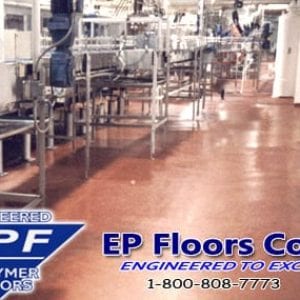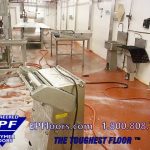Comparison of Tufco Flooring, Epoxy, Ucrete & Urethane Cement Flooring
Comparison of Tufco Flooring, Epoxy, Ucrete & Urethane Cement Flooring
Food & beverage processing plants and flooring systems are under close scrutiny by regulators. In these plants, where cleanliness and purity are requisite, concrete floors must be covered with seamless, hygienic floor coating system. Floors in a food or beverage production facility are exposed to all sorts of food byproducts, including hot oils, ‘fats, blood, bacteria, sugar solutions, and food acids. Due to the corrosive nature of these substances, they can promote serious damage to concrete. Cracks and pores in the surface can allow damage to spread, and allow bacterial growth.
Floor coating systems have been developed to meet this range of service conditions, and frequently, there are a number of systems that can be used for an application. For years, facility managers relied on a wide range of specialty floor coating products to fulfill any number of requirements:
Epoxies – These coatings are typically trowel-applied, two-component systems. A wide variety of textures and colors may be achieved by broadcasting aggregates to create non-slip or skid-resistant floors. Epoxy flooring has been a mainstay in food & beverage plants for decades, until they were replaced by urethane mortars in the 90’s. Epoxy is still is good choice in dry (non washdown) areas of food plants, such as packaging areas. However, the do not hold up well to damp, cool conditions, with chemicals or thermal shock.
Urethane Cement- Also known as cementitious urethane mortar floors, or urethane slurries, these systems provide superior resistance to thermal cycling when compared to epoxy and vinyl ester coatings in addition to providing excellent long-lasting performance. These systems such as Puma-Crete, Ucrete, and others have very low odor during application, along with a seamless, chemical resistant surface, and anti slip texture. Additional advantages are fast drying capabilities. Plants may be returned to service in as little as 8 hours. These systems handle heavy traffic conditions, impact, and all around difficult conditions.Food processing facilities are often very damp, sometimes cool or even cold, and sometimes hot, all in a typical day. Modified urethane cementitious flooring systems perform in steam heat conditions, as well as freezing or below zero temperatures. BASF Ucrete – these products are urethane mortars, urethane cement slurries, and epoxy coatings. Available in decorative versions as well as solid colors, Ucrete is a brand that has been around for decades, and the product line has been bought and sold to many different owners, throughout the years.
Tufco- this flooring is typically a liquid applied (squeegee/roller) system, consisting of a vinyl ester resin, and silica aluminum oxide aggregates. The number of layers will determine the final thickness. The resins generally contain volatile organic compounds (VOC’s) which have a strong odor. There are some variations without vinyl ester, but these do not have equal performance. The vinyl ester system has good adhesion to dry prepared concrete, good durability, and excellent chemical resistance. There is a recent addition of urethane mortar materials to the Tufco lineup.
About EP Floors Corp.
For more information on EPF, click here: Food Processing Floors
E P Floors provides a wide variety of consulting and full service cementitious urethane mortar floors and contracting of floors for all types of food & beverage processing facilities. Specializing in urethane mortar flooring, E P Floors is vertically integrated, providing single source responsibility, and a five year warranty.
For more information contact us at 1-800-808-7773 or info@epfloors.com





